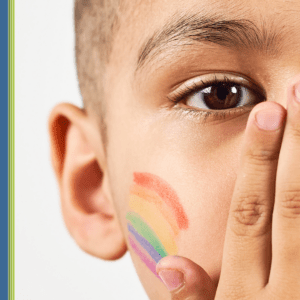It takes courage for a child to come out as LGBTQ. While a parent may have a variety of responses, here are some important Do’s and Don’ts to keep in mind.
 DO:
DO:
- Demonstrate Unconditional Love.
- Simple actions such as a hug, warm smile, and “I love you” are so powerful in addition to showing your child that you love them unconditionally.
- Provide Acceptance.
- Show that you see and respect your child for who they are. Ask your child how they want to be referred to. Help them feel affirmed.
- Take time to get to know your child, their identity, and the ways in which they express themselves. Get to know their friends and partner(s)
- Be Emotionally Supportive.
- Home should be a place where your child can feel physically and emotionally safe. Model hope and normalcy for your child.
- Listen and Talk.
- Hear what your child wants to share with you and believe them. Talk, using open-ended questions, and listen. Ask your child how you can be supportive.
- Respect Confidentiality and Boundaries
- Your child may or may not feel comfortable with disclosures to others. Respect this.
- Take Time to Process and Educate Yourself.
- Anticipate that there may be some confusion or discomfort after disclosures related to gender and sexuality. Find your own support and resources.
- Become an Ally to the LGBTQIA+ Community.
- Learn how to advocate for your child. Challenge homophobia. Speak up! Don’t remain silent.
DON’Ts:
- Don’t provide ultimatums, “disown”, or show conditional love because of coming out.
- Don’t reject your child or their experience as “just a phase”.
- Don’t make emotionally abusive comments that your child is a disgrace, disappointment, etc. based on their identity.
- Don’t over-question, minimize, or doubt your child.
- Don’t make assumptions as this can invalidate your child’s experience. Saying things like “I knew it” or “Are you really sure?” is unhelpful.
- Don’t refuse to address your child by their pronouns.
- Don’t “preach”, shame, or use religion against them.
- Don’t give the impression that you are scared for them (e.g. that being LGBTQ is embarrassing)
Love, support, acceptance, and respect is so important!
Consider this:
40% of LGBTQ respondents seriously considered attempting suicide in the past twelve months, with more than half of transgender and nonbinary youth having seriously considered suicide. https://www.thetrevorproject.org. Transgender and nonbinary youth who reported having pronouns respected by all or most people in their lives attempted suicide at half the rate of those who did not have their pronouns respected. Other important factors for mental health wellness for LGBTQ youth included in-person LGBTQ affirming spaces and high levels of support from family, friends, or a special person.
Resources:
https://pflag.org/
https://namimn.org/education-and-public-awareness/nami-resources-lgbtq-community/
https://www.glaad.org/resourcelist
Written By: Charlotte Johnson, MA, LPCC
We’re Here to help
Our wellness experts will be happy to take care of you. You can CLICK HERE to schedule an appointment now or call (612)223-8898.
Meet Clinicians
We’re united by our commitment to providing effective, relevant, and innovative mental health support at all stages of your journey. Click Here to find out more about who we are, where we come from, and how we live out CARE’s mission every day.
The professionals at CARE are actively collecting and creating resources to help with what you need. We’re Here for You.



